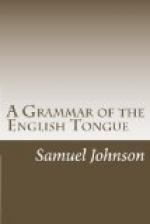close, to close, a clod, a clot, as a clot of blood,
clouted cream, a clutter, a cluster.
Sp imply a kind of dissipation or expansion, especially a quick one, particularly if there be an r, as if it were from spargo or separo: for example, spread, spring, sprig, sprout, sprinkle, split, splinter, spill, spit, sputter, spatter.
Sl denote a kind of silent
fall, or a less observable motion; as in
slime, slide, slip, slipper,
sly, sleight, slit, slow, slack, slight,
sling, slap.
And so likewise ash, in crash, rash, gash, flash, clash, lash, slash, plash, trash, indicate something acting more nimbly and sharply. But ush, in crush, rush, gush, flush, blush, brush, hush, push, imply something as acting more obtusely and dully. Yet in both there is indicated a swift and sudden motion not instantaneous, but gradual, by the continued sound, sh.
Thus in fling, sling, ding, swing, cling, sing, wring, sting, the tingling of the termination ng, and the sharpness of the vowel i, imply the continuation of a very slender motion or tremor, at length indeed vanishing, but not suddenly interrupted. But in tink, wink, sink, clink, chink, think, that end in a mute consonant, there is also indicated a sudden ending.
If there be an l, as in jingle, tingle, tinkle, mingle, sprinkle, twinkle, there is implied a frequency, or iteration of small acts. And the same frequency of acts, but less subtile by reason of the clearer vowel a, is indicated in jangle, tangle, spangle, mangle, wrangle, brangle, dangle; as also in mumble, grumble, jumble. But at the same time the close u implies something obscure or obtunded; and a congeries of consonants mbl, denotes a confused kind of rolling or tumbling, as in ramble, scamble, scramble, wamble, amble; but in these there is something acute.
In nimble, the acuteness of the vowel denotes celerity. In sparkle, sp denotes dissipation, ar an acute crackling, k a sudden interruption, l a frequent iteration; and in like manner in sprinkle, unless in may imply the subtilty of the dissipated guttules. Thick and thin differ in that the former ends with an obtuse consonant, and the latter with an acute.
In like manner, in squeek, squeak, squeal, squall, brawl, wraul, yaul, spaul, screek, shriek, shrill, sharp, shrivel, wrinkle, crack, crash, clash, gnash, plash, crush, hush, hisse, fisse, whist, soft, jar, hurl, curl, whirl, buz, bustle, spindle, dwindle, twine, twist, and in many more, we may observe the agreement of such sort of sounds with the things signified; and this so frequently happens, that scarce any language which I know can be compared with ours. So that one monosyllable word, of which kind are almost all ours, emphatically expresses what in other languages can scarce be explained but by compounds, or decompounds, or sometimes a tedious circumlocution.
We have many words borrowed from the Latin; but the greatest part of them were communicated by the intervention of the French; as, grace, face, elegant, elegance, resemble.




